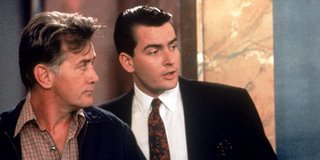Wall Street

After taking audiences deep into the heart of combat in his Vietnam-epic "Platoon," Oliver Stone showed filmgoers a different kind of jungle in 1987's "Wall Street." Instead of bullets and guns, these warriors brandish power suits and killer smiles, but they are ruthless all the same.
The film is both a scathing social study of the forces of greed that have shaped Western culture and a brilliant consideration of the biblical question: What does it profit a man if he gains the whole world at the expense of his soul?
The film opens in the year 1985 in the middle of the "biggest bull market in history." Television funnyman Charlie Sheen plays the freshly pressed Bud Fox -- an up-and-coming stockbroker who dreams of the big time.
All day he sits in his frenzied office cold-calling potential clients, but all the while he's thinking about what it would be like "to be on the other side of that phone."
But Stone and co-writer Stanley Weiser don't make Bud's fall from grace so simple. He has a loving father, Carl, played by Martin Sheen, who tries to keep young Bud grounded.
Carl represents the honest everyday working American. He has a relatively good union job with the fictional Blue Star Airlines, and counts himself blessed for what he has. Most certainly, unlike most of the piranha Bud encounters on a day-to-day basis, he doesn't judge a man "by the size of his wallet."
But even though all the signs say, slow down, Bud hastens his descent. "There's no nobility in poverty," he says matter-of-factly.
Since it has always been his dream to be at the top, Bud knows the quickest way up is by riding somebody else's coattails. And so, for months he doggedly tries to nab the biggest fish in the corporate sea -- Gordon Gekko, played by the polished Michael Douglas.
After he gets a meeting with the egomaniacal corporate raider, Bud lets slip a piece of insider information. And when that tip pays off, Gekko takes to the boy and Bud begins his descent.
Admonishing Bud with lines like, "Remember sport there are no shortcuts," Gekko cajoles the fresh-faced upstart to gain information by any means necessary.
And after he utters the words, "Alright Mr. Gekko, you've got me," there's no turning back. Bud engages in a series of unethical acts, but just as his sense of self is under attack, Bud's material life explodes. He gets a fancy new apartment and meets a beautiful interior designer, Darien Taylor, played by Darryl Hannah.
But when Blue Star finds itself in Gekko's crosshairs, Fox really has to decide what kind of man he's destined to be. Is he going to be someone who continues to "make his living off the buying and selling of others," or will this be the lighting stroke that restores young Bud?
Stone seems to answer that question, but never gives us the complete ending. That the film ends slightly ambiguously, though, in no way detracts from its powerful message. Somehow along the way, we've been corrupted by the notion that money equals happiness and success. Stone never comes right out and says this is wrong, but Bud's final denouement shows us how much we stand to lose chasing the elusive money dream.
The film is best remembered for Michael Douglas' often quoted, "Greed is good" speech, which was inspired by a commencement address given by former Wall Street hotshot Ivan Boesky. But viewed as part of Stone's oeuvre, "Wall Street" shows the work of a director who has been able to coax some wonderful performances out of his actors, while writing and directing pictures that hold a mirror up to us and show us what we are.
Michael Douglas won the film's only Oscar for Best Actor at the 60th Annual Academy Awards in 1988.

0 Comments:
Post a Comment
<< Home